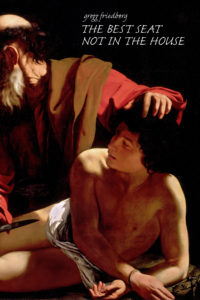The Best Seat Not in the House by Gregg Friedberg

The Best Seat Not in the House is a sequence of poems with a narrative thread, treating a matrix of themes (as described in the poem “PREFACE” below) from an evolving perspective. The first edition, published in 2010 by Main Street Rag, contained a slightly abridged version of the sequence. The new, Embajadoras Press edition is the unabridged version of the work.
PREFACE
Whether author or God, it’s his own redemption –
his or hers – the creator seeks, creating. A desperate quest, but something must be done.
Redemption’s most convincing that’s hardest won:
So more comfortably accomplished through a proxy
in a subordinate frame of reference. If I’m God,
I’ve got no choice: my creation’s all I’ve got.
And though my surrogate – character or creature –
must suffer, suffer awfully, he – he or she –
mustn’t be purely victim. Else I were purely monster!
He allows, at times his abuse is just desert.
Between pleas for forgiveness he rails at me.
Between episodes of torture I pity him, hold out hope.
Can I really redeem myself by shunting my predicament
to the next story down?
redeem him
whose proxy – presumably – I am?
And what choice has he, my creature, but likewise
to undertake his own redemption?
by his own Word
tease a cruel world out of the Void . . .
and though the suspicion of depravity will nag at him
too.
Three poems from The Best Seat Not in the House:
VOICES YOU SLEPT AND WOKE TO
The take and give of your mother,
the give and take of your father,
the murmur of voices you slept and woke to
inside the womb.
Tucked in a basket in the midst of a picnic:
something in the grass
slithered right up to you.
At roadside, your burnished thumb open
for business.
In a window, expecting.
Skyblue and tempest, palace and hovel,
musk and citrus, song and howl,
dance and sickbed –
vary the spices, salt to taste,
but it all came to this:
your waist in a wrench of beast’s paws,
your nape in the vise of his jaws,
while he poked about in your cozy foyer.
Crawl back to, climb into the lap
of those voices that gave you meaning?
that you gave meaning to?
You were crying then too, suspicious and wet.
You forget.
SEER
The dark boy behind the diamond-braid fence
holds a rag that drips smutty water.
According to my pencil he does windshields
and spectacles – the sightseer’s friend.
Eyes you awhile, then comes over to me,
studies this page.
Swaggers over to you, jeans full of dust
in the cuffs, full of him in the crotch.
Picks his nose, works out our connection.
Now the litter’s atwitter like hatchlings.
Swaggers back to me – really swaggers.
¿Algo para él? he asks, presents
his illustrated palm.
¿Cómo no? I scribble a prayer, press it
onto the skull and crossed bones.
He swaggers over to you, flourishes it
like a magician,
pokes it through a diamond, slips it
into your pocket,
then threads through a sorry corner of his rag
and wipes your specs.
NOTES TOWARD A BOY MOWING
My hand’s teaching you, shuttling slowly
below the sill, about the boy mowing
the common, breaking the Sabbath.
He’s carved clumsy initials on the bases
of birches, sparks a knob of granite now
and again. Woke the dog, then seduced her!
To the lord of the land complain,
to the tablets and gavel of village council!
Vainglory his standing blue veins. Go down,
stand in his way, peep into his shirt, into
the shimmery vale of sweat,
wag your finger: mustn’t pet her
Every one of his fingers a mischief . . .
and the salt licks of his golden calves.
